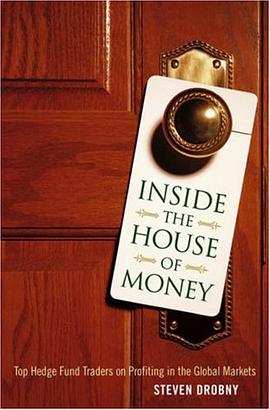Inside the House of Money
内容简介
在线阅读本书
Book Description
Inside the House of Money lifts the veil on the typically opaque world of hedge funds, offering a rare glimpse at how today's highest paid money managers approach their craft. Author Steven Drobny demystifies how these star traders make billions for well-heeled investors, revealing their theories, strategies and approaches to markets. Drobny, cofounder of Drobny Global Advisors, an international macroeconomic research and advisory firm, has tapped into his network and beyond in order assemble this collection of thirteen interviews with the industry's best minds. Along the way, you'll get an inside look at firsthand trading experiences through some of the major world financial crises of the last few decades. Whether Russian bonds, Pakistani stocks, Southeast Asian currencies or stakes in African brewing companies, no market or instrument is out of bounds for these elite global macro hedge fund managers. Highly accessible and filled with in-depth expert opinion, Inside the House of Money is a must-read for financial professionals and anyone else interested in understanding the complexities at stake in world financial markets.
"The ruminations of supposedly hush-hush hedge fund operators are richly illuminating." -- New York Times
From the Inside Flap
In today's difficult investment environment, where geopolitical and social instability compound an already challenging search for higher returns, hedge funds have outperformed. As a result, assets under management have exploded and top investment talent has migrated over to hedge funds. Amidst the growth and evolution of the business, one strategy—global macro—has remained true to its original mandate of absolute return investing, which seeks outsized returns from investments anywhere in the world, in any asset class, and in any instrument.
Although successful money managers often have a reputation for being reluctant to discuss their market views and trading strategies, Inside the House of Money opens the door to the typically opaque world of hedge funds—particularly global macro investing—and offers a rare glimpse into a high-intensity environment where enormous stakes are a part of everyday life. As cofounder and partner of Drobny Global Advisors—an international macroeconomic research and advisory firm—author Steven Drobny has access to a broad selection of today's top global macro hedge fund managers. Through detailed interviews with more than a dozen of these individuals, Drobny provides you with an inside look at how these money managers view world markets and offers subtle insights into how they make money.
First, you will receive an introduction to global macro from a professional investor's perspective. Then, you will discover how some key historical events have shaped this field. You will also learn how future events, such as increased competition and specialization, are pushing today's global macro manager into the realm of global micro investing. With this information in hand, you'll go Inside the House of Money through a collection of in-depth interviews with a variety of money managers, each with a unique perspective and approach to global markets, including:
* The Family Office Manager: Jim Leitner (Falcon Management)
* The Prop Trader: Christian Siva-Jothy (SemperMacro)
* The Treasurer: Dr. John Porter (Barclays Capital)
* The Central Banker: Dr. Sushil Wadhwani (Wadhwani Asset Management)
* The Dot-Commer: Peter Thiel (Clarium Capital Management)
* The Pioneer: Jim Rogers
* The Commodity Specialist: Dwight Anderson (Ospraie Management)
* The Emerging Market Specialist: Marko Dimitrijevic (Everest Capital)
And others
Filled with in-depth insight and real-world experiences of top hedge fund traders, Inside the House of Money reveals how the best minds in the business identify and profit from opportunities in every corner of the globe.
Book Dimension
length: (cm)23.1 width:(cm)15.9
......(更多)
作者简介
......(更多)
目录
......(更多)
读书文摘
有个关于芝加哥交易所的一个有名的交易员的故事。一天,他正在芝加哥交易所大厅,这时,美国的通货膨胀数字公布出来,数字完全出人意料,结果引起大厅的大混乱。当所有的吵闹平息过后,他赚了一千万美元。当他从交易厅走出时说:“拜托问一下,刚刚公布的通货膨胀律是多少?”
比如,当土耳其1999年发生大地震时,我们买进了大量的玻璃制造商的股票,因为我们知道每个人都将不得不重建他们的窗子。
......(更多)






